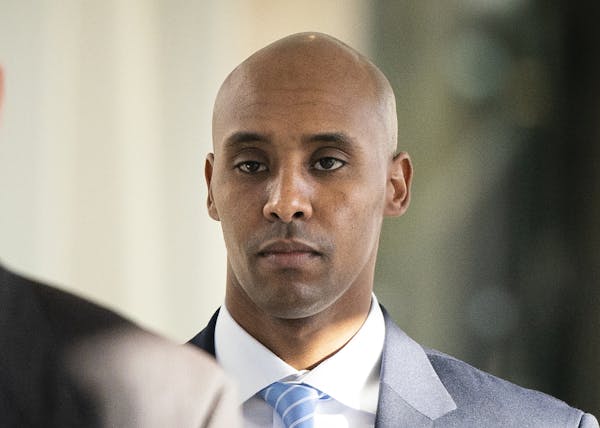The day after a jury found one of their former officers guilty of an on-duty murder, Minneapolis City Council members met for nearly two hours in a closed-door session Wednesday to discuss what could become one of the city's largest police-misconduct payouts.
The family of Justine Ruszczyk Damond last year filed a $50 million civil rights lawsuit against ex-officer Mohamed Noor, the police department and the city. The suit alleges unreasonable use of deadly force, improper training and a conspiracy to cover up the shooting on the part of Noor and his fellow officers.
The city began private mediation with the Damond family's attorney, Robert Bennett, on Wednesday morning, according to a source familiar with the proceedings.
About 2 p.m., council members entered a closed session to discuss the case in City Hall. Mayor Jacob Frey and Police Chief Medaria Arradondo were also present. Afterward, City Attorney Susan Segal declined to comment, other than to say she'd briefed elected officials.
"It's all attorney-client privileged, and that's all that I can tell you," Segal said.
At a news conference earlier in the day, Frey avoided going into specifics about the Noor verdict because of the lawsuit.
"The case, no matter how you look at it, is heavy," he said. "Minneapolis is an extraordinary city, and like cities throughout the nation, we also have difficulties with police and community relations. I think that's a given, that's a truth, and it's something that should be acknowledged."
For attorneys on both sides, the criminal trial offered a preview of the evidence and witness testimony they can expect if the Damond family's suit heads to trial.
It is far more common, however, for these types of cases to be settled out of court.
The politics of the case and the racial realities of the justice system could make for a costly settlement, said civil rights attorney Paul Applebaum, who has represented victims of Minneapolis police in use-of-force cases.
"I'm going to be blatant. This was a middle-aged, attractive white woman who by all accounts was a tremendous human being," Applebaum said. "And that's going to be one of the motivating factors in the city settling, because of her appealing personality and what she'd accomplished in her life. That's an easy sell for a plaintiff's lawyer."
There have also been recent Supreme Court cases that make it more difficult for people to sue police officers, Applebaum said, which could play in the city's favor.
Also to be decided is whether the city will indemnify Noor — meaning will it take legal responsibility for his actions or argue that Noor acted with such willful neglect that the city isn't liable?
In January, Bennett sent a letter to the judge asking for guidance on whether the city would indemnify Noor.
Segal wouldn't talk about the city's strategy on the issue Wednesday.
Legal settlements are typically paid out of Minneapolis' self-insurance fund.
The city paid out its largest police-related settlement of $4.5 million in 2007 to Duy Ngo, a police officer shot by another officer who mistook him for a fleeing suspect. In another case, it paid $3 million to the family of David Smith, who died after a struggle with police at the YMCA in 2010.
Bennett represented plaintiffs in both cases, as well as the family of Philando Castile, who won $3 million last year after St. Anthony police officer Jeronimo Yanez shot and killed Castile during a traffic stop.
In Chicago, the City Council approved a $5 million payment to the family of Laquan McDonald, a 17-year-old shot and killed by a police officer. The Chicago officer lost his job and was convicted of second-degree murder, but his criminal trial took place after the settlement.
Former Minneapolis City Council President Barb Johnson, who represented the city in many police-misconduct mediations, said it's too early to say exactly how the guilty verdict will affect negotiations. In such meetings, the city attorney usually leads the negotiation from the city's side, though a council member must be present, she said.
"You go into that room and you just want to … protect the city's taxpayers, but you also want to do the right thing," Johnson said. "And it's a hard call sometimes."
Staff writer Paul Walsh contributed to this report.
Andy Mannix • 612-673-4036

Want to share info with the Star Tribune? How to do it securely

'Safe recovery sites' would offer syringes, naloxone and more to people using drugs. The plan could be in peril.
New Minnesota GOP leaders seek peace with party's anti-establishment wing

Who is Republican Lisa Demuth, Minnesota's first House speaker of color?

